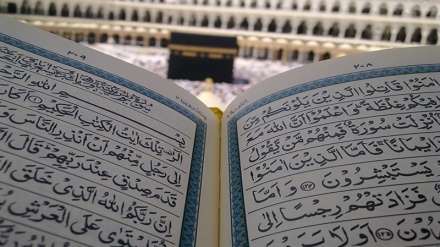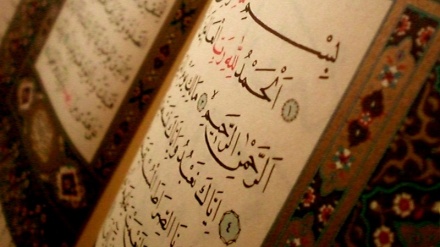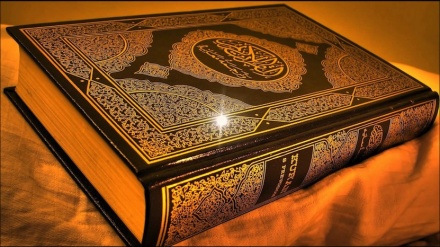Path towards Enlightenment (1052)
Welcome to our latest episode of “Path towards Enlightenment”, which is an endeavour to make you and us familiar with an easy and fluent explanation of God’s Final Scripture to all mankind, the holy Qur’an that was revealed to the Last and Greatest of all Messengers, Prophet Mohammad (Blessings of God upon him and his progeny).
Last week we started explanation of “Surah al-Qiyamah”, the 75th in order of compilation of the Holy Qur’an. It has 40 Ayahs and was revealed in Mecca. The title means “The Day of Resurrection” or “The Rising”. It opens with the Almighty Creator’s emphatic oath “By the Day of Resurrection”. It disproves the denial of the Day of Resurrection by unbelievers through a convincing description of God’s Infinite Power of creation of everything in an exquisite manner from nothing, which is ample proof of restoration of the same thing or person in its original form long after destruction, death, decay and disintegration of bones into dust. In other words, the creation of mankind from a drop of semen as a token of Divine Omnipotence in recreating human beings after death is logical and beyond an iota of doubt. In short, the Surah makes mention of the happy and sorrowful fate of the good and evil doers.
According to a hadith the regular recitation of Surah al-Qiyamah and observing its injunctions shall enable the reciter to safely cross the Siraat or the Bridge to Paradise on the rim of Hellfire on the Day of Resurrection.
We start from where we left you last week, and here are Ayahs 16, 17, 18, and 19:
“(O Prophet) move not your tongue with it (the Qur’an) in haste.
Indeed, it is up to Us to put it together and to recite it.
“And when We have recited it, follow its recitation.
“Then, indeed its exposition [too] is up to Us.”
If you might recall our explanation of the previous Ayahs of this Surah last Friday, we had said that on the Day of Resurrection the disbelievers and the unrepentant sinners will be witness to the deeds they had done and will find no excuse for denial of truth. No one, however, will be wronged in the Divine Court and the forgiveness of the All-Merciful Lord will prevail for the deserving.
These four Ayahs which we recited to you now are neither related to the previous ones nor to those that follow. Here the address is to the Prophet of Islam on whose heart the entire Qur’an had been revealed on the Grand Night of Qadr in the month of Ramadhan and thereafter the gradual revelation of the same Heavenly Scripture in parts, as per the occasions, over the 23-year period of his mission. This means the Qur’an was fully memorized by the Prophet who was well aware of all Ayahs whenever the Archangel Gabriel brought them in parts. Thus he is being told not to make haste in recitation of the Qur’an, and to recite the Ayahs in accordance with the order of revelation, as per Divine Will, since the exposition is up to God the All Wise. In other words, care is being taken to avoid confusion amongst people of the words of God and the words of the Prophet.
From these Ayahs we learn that:
- The glorious Qur'an is the Revealed Word of God Who has ensured that no confusion or distortion will ever occur regarding this Eternal Miracle. .
- The Prophet had no role in the composition of the Ayahs, although the entire Heavenly Scripture was entrusted to his heart on the Grand Night of Qadr, and then gradually revealed in parts over the 23 years of his mission.
Now let us listen to Ayahs 20, 21, 22, 23, 24, and 25 of the same Surah:
"No indeed! Rather you (unbelievers) love this transitory life,
“And forsake the Hereafter.
“Some faces will be fresh on that day (of Resurrection),
“Looking at (the glories of) their Lord,
“And some faces will be scowling on that day,
“Knowing they will be dealt a spine-shattering punishment."
These Ayahs address the unbelievers and the deniers of truth and Resurrection of their eventual fate, as well as reminding them of the rewards reserved for the true believers on the Day of Judgement. They are so immersed in the transient life of the mortal world and its perishing pleasures without any observance of good and evil that they have completely forgotten the Hereafter and the course of their soul when death overtakes them.
Ayahs 22 and 23 refer to the state of bliss of the true believers on the Day of Resurrection when the faces of the righteous will be bright and fresh, while engrossed in the indescribable glories of Almighty God. The next two Ayahs point to the horrified and scowling faces of the unbelievers and the unrepentant sinners who shudder at the sight of the terrible punishment in store for them. They rue of the depraved life they had led without heeding the words of guidance of the Prophets, Saints, and Virtuous Scholars, but now nothing can save them from the dire consequences of their denial of truth and sins.
These Ayahs teach us that:
- It is no harm to legally enjoy the bounties of the world, but excessive attachment to material life or immersion in sins and unbelief, leads to ignoring of the Hereafter.
- Human life is very short as this world itself is transitory; hence we ought to be very careful by selling our souls to the devil in pursuit of perishing pleasures.
- Those with proper cognition of God, striving for virtue, and patient in hardships will be blessed with the bounties of the All-Merciful Lord, especially manifold in the Hereafter.
In conclusion of this week’s episode of Path towards Enlightenment here are Ayahs 26, 27, 28, 29, and 30 of Surah al-Qiyamah:
"No indeed! When the soul reaches up to the collar bones,
“And it is said (by the angels), 'who will take him up?'
“And he knows that it is the (time of) parting,
“And each shank clasps the other shank.
“That day he will be driven toward your Lord."
These Ayahs point to the throes of death of persons who had denied truth and the Day of Resurrection, while living a depraved life of sins and unbridled pleasures. It is the state when the departing soul reaches the throat and windows are opened to the other world with the veils cast aside from the eyes, making such a person see the tokens of torment and punishment awaiting him or her. Belief will be of no avail at this moment when the angels of mercy and the angels of wrath are present at the side of the dying person, saying as to which of them will take charge of such a person. The family or friends of the dying unbeliever or sinner search in vain for a physician or someone to ward off death with a prayer.
These Ayahs deal with the moments of death harder than the birth of a child from the mother's womb accompanied by pains and cries. The agony of death cannot be averted. No physician, no so-called holy person of their clan and no idol the polytheists worship, can save the dying unbeliever or and sinner, who will have a terrible end while returning to the presence of the Almighty Creator, Whom he/she had disobeyed throughout life.
A statement from the Prophet’s 6th Infallible Successor, Imam Ja’far Sadeq (AS), says of death: “It is like a sweet scent to the believer by which he falls into a state of sleep in which he is totally untouched by pain and torment, but to the disbeliever, it is like the bites of serpents and scorpions or even more painful than them”
These Ayahs teach us the following points:
- The life and death of every person, whether believer or unbeliever is determined by Almighty Allah.
- The moment of death is the time of parting from properties, children, family, friends, and everything – a very terrible state for those immersed in the material life of the transient world.
- Death is not the end of a person; rather it is the return of the soul to the Source of creation, and the start of a new phase passing through Barzakh or the intermediary state until eventual resurrection of the body on the Day of Judgement.
RM/AS/ME


